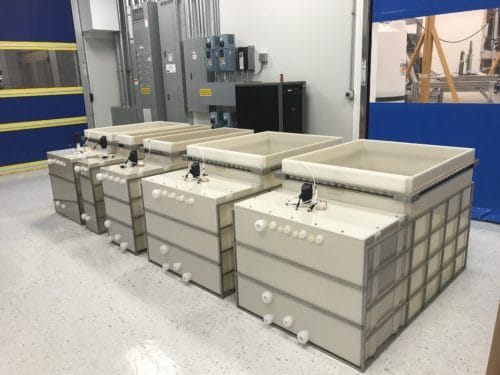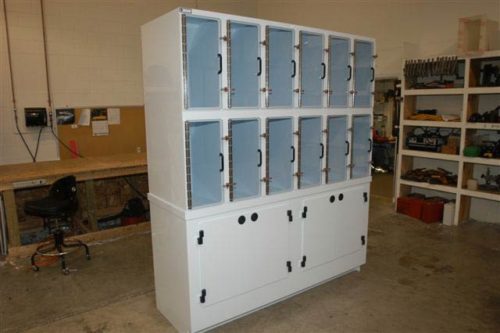Machining is an umbrella term for the controlled, subtractive manufacturing techniques used to produce parts made from a wide range of materials. Today, many companies employ computer numerical control (CNC) machining to achieve greater precision and accuracy in their end products.
When deciding on a machining method for a part, it is essential to keep in mind the design and construction material as these factors significantly impact the production process and final result. For plastic machining projects, these considerations are especially important due to the greater susceptibility of plastic materials to warping, cracking, and deformation when improperly handled. Further exacerbating the problem is the broad selection of plastics and plastic composites available, with each type exhibiting its own properties and best use cases. Altogether, these challenges necessitate partnering with a supplier who demonstrates a deep understanding of your chosen material.
With over 40 years of experience in plastic fabrication, Plastic Design, Inc. has the knowledge and skills necessary to take on any plastic machining challenge. Equipped with state-of-the-art CNC machining equipment, our expert team has the means to perform several different types of machining processes on a variety of industrial plastics to execute the optimal manufacturing plan for every product.
An Overview of Plastic Machining Services
 Like all machining processes, plastic machining is a subtractive method that removes layers of material to shape and form the end part or product. Some of the most common machining operations employed for plastic materials are:
Like all machining processes, plastic machining is a subtractive method that removes layers of material to shape and form the end part or product. Some of the most common machining operations employed for plastic materials are:
Cutting
Generally, cutting operations generate some amount of heat, which can damage the plastic material. When cutting plastics, operators must take care to avoid causing thermal warping. With proper precautions, sawing is completely appropriate for cutting plastic sheets to a desired size and shape.
Turning
Plastic turning operations occur on a lathe, which rotates and manipulates the workpiece to allow the stationary cutting tool to cut and remove excess material as per the intended design.
Milling
While turning operations involve the rotation of the plastic workpiece, milling operations require the rotation of the cutting tool to remove chips of plastic from the stationary workpiece. Some milling techniques work better with plastics than others (such as down-milling), but the ideal choice depends on a number of factors.
Drilling
Drilling plastics can be risky, resulting in overheating or shearing if the proper drill isn’t selected. However, given the proper preparation and tools, a skilled technician can create both small and large diameter holes in a plastic product without damaging its structure.
Grinding
Grinding is similar to milling in that the process removes chips of plastic from the workpiece to alter its shape. The main difference is that milling uses intermittent cuts, whereas grinding continuously shears plastic from the product to achieve a smoother shape and surface finish.
Common Materials Used in Plastic Machining
Plastics present some challenges for machining operations. For example, some plastic materials can have:
 Lower thermal resistance than metals, resulting in a higher risk of thermal expansion, overheating, and thermal damage
Lower thermal resistance than metals, resulting in a higher risk of thermal expansion, overheating, and thermal damage- Higher material costs
- Greater machining restrictions
Despite these limitations, plastic remains a common construction material for machined parts and products. In general, plastics offer several manufacturing advantages, such as:
- Superior strength-to-weight ratios
- Broader insulating properties (including electric, thermal, and vibration)
- Greater resistance to corrosion and chemicals
Specific plastics also maintain their own unique benefits. For example, the following are some of the most commonly used plastics in machining operations:
- Ultra-high molecular polyethylene (UHMW), due to its high machinability
- Nylon, due to its affordability, strength, durability, and corrosion and chemical resistance
- Acrylic, due to its formability, high tensile strength, and resistance to cracking and abrasion
- Polyether ether ketone (PEEK), due to its chemical and wear resistance and ability to withstand high temperatures
Considerations for Plastic Machining
Ensuring the success of a plastic machining project requires choosing construction materials and machining operations that are well-suited for each other. When planning a plastic machining project, some of the factors to consider are:
Plastic type
Different chemical compositions yield different physical characteristics, impacting everything from strength and chemical resistance to the cost of the material. When choosing a plastic material for a machined part, it is important to keep these properties in mind as they will influence how well the material withstands the stresses of manufacturing and the end product withstands the stresses of the intended application.
Thermal regulation
In general, plastics melt at substantially lower temperatures than metals. As such, proper heat regulation, including the use of coolants, is essential if a polymer is to withstand machining.
Process support
As plastics are less rigid than metals, the vibrations generated by the machining operations can more easily cause burrs, cracks, and chatter marks. Incorporating additional support structures during machining operations reduces the risk of damage to the end product.
Finishing options
Many companies employ finishing services to enhance the functional and aesthetic properties of a machined product. Some of the typical finishing processes are annealing, polishing, and coating.
Applications of Plastic Machining
 Considering the benefits and limitations in sum, plastic machining is still one of the best options for producing a variety of industrial parts and products, such as:
Considering the benefits and limitations in sum, plastic machining is still one of the best options for producing a variety of industrial parts and products, such as:
- Biomedical and pharmaceutical devices
- Chemical handling equipment
- Food handling components
- Laboratory and scientific equipment
- Microelectronics
- Photonics
- Semiconductor components
Plastic Machining Services From Plastic Design, Inc.
At Plastic Design, Inc., we have the tools and knowledge required to machine nearly any plastic product. Our expert team takes projects from initial design to delivery of a turnkey product or system.
Our Plastic Machining Capabilities
We use cutting-edge CNC machines to craft precise plastic parts and components to tight tolerances. Our machining capabilities are as follows:
| Machining Operations |
|
| Plastic Forms |
|
| Plastic Materials |
|
| Sizes |
|
| Production Volumes |
|
Additional Capabilities
In addition to our plastic machining capabilities, we also offer:
Original Equipment Manufacturing
Over our years serving customers in the biomedical, pharmaceutical research, and semiconductor industries, we’ve garnered significant knowledge about the requirements expected for the equipment and systems used in the industries. This expertise allows us to serve as an original equipment manufacturer (OEM) of custom-built parts and equipment. With our OEM services, we provide technical guidance to take products from concept to completion.
Specialty Product Manufacturing
Outside of our OEM partnerships, we also manufacture a full catalog of specialty products for customers across a wide range of industries. Some of these past projects have included:
- Automated wet process systems
- Desiccators
- Fume hoods
- Hazardous waste systems
- Tank lines
What Makes Us Different?
At Plastic Design, we are an ISO 9001:2015 certified fabricator. By partnering with us for their plastic machining needs, our customers benefit from our:
- Over 40 years of experience in plastic manufacturing
- Knowledge of specialized fields, including the biomedical, pharmaceutical, and semiconductor industries
- 30,000-square-foot fabrication facility
- OEM manufacturing capabilities
These characteristics allow us to meet some of the most difficult design challenges out there while forming lasting relationships with our industry clients.
Plastic Machining Solutions From Plastic Design, Inc.
Choosing a knowledgeable manufacturer for a plastic machining operation is the key to successful completion of the project. Plastics require specialized expertise to prevent expensive defects or product failures during production, and only a dedicated plastics provider can guide you through the complex material selection and testing process.
At Plastic Design, Inc., we have the technical capabilities and industry knowledge necessary to produce high-quality and cost-effective parts and products from a wide range of plastics. Whether you’re seeking a one-off prototype or a high-volume production run, we’ll work with you to turn your design into a reality.
To learn more about our plastic machining capabilities, contact us or request a quote today.


Comments are closed